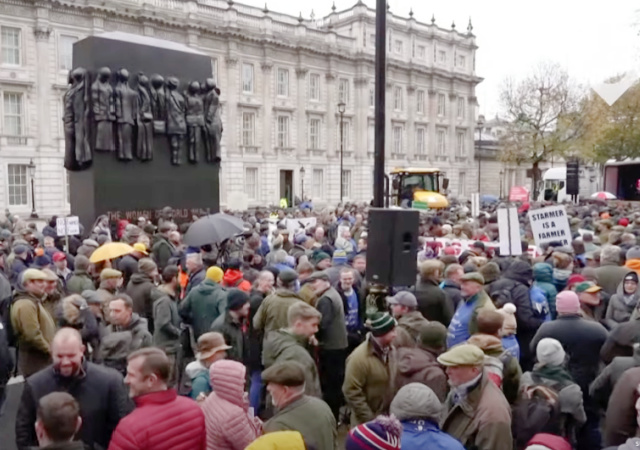Thousands of British Farmers Protest Changes to Inheritance Tax

Thousands of British farmers have been protesting in Westminster against changes to the inheritance tax rules.
Rachel Reeves, the Chancellor of the Exchequer, announced the plans included adding a 20% inheritance tax on farms worth more than £1 million (around $1,264,718.16).
It would start in April 2026.
People are ticked off because the Labour Party promised to support farmers.
Sky News spoke to one farmer:
“It’s unfortunate, as Labour had originally said they would support farmers,” said fourth-generation farmer Will Weaver, who is attending today’s rally.His 500-acre cow and sheep farm in South Gloucestershire has been in his family since 1939.”We’ve probably buried our head in the sand a little bit. I think, back of a fag-packet rough estimates, tax is going to be north of half a million [pounds].”The government is keen to stress that farmers will get a decade to pay the bill – but that comes as little comfort to Will: “It’s more than our profit in any year that we’ve had in the last 10 years. Dad’s saying we’ll have to sell something. I don’t know if we’ll be able to raise that sort of money through a mortgage. It’s really worrying.”
Of course, the government claimed that most farms won’t have “to pay a penny,” but the National Farmers Union and other advocates insisted “the government’s figures are incorrect.”
According to tax experts, if a farming couple uses all exemptions, they “could plausibly pass on a farm worth £3 million to a child or grandchild without being affected.”
Individuals who own a farm could “pass on land and property valued up to £1.5 million tax free to a direct descendant.”
However, the government admitted it changed the rules to crack down on people using the lack of inheritance tax on farms to buy agricultural plots.
Jeremy Clarkson, best known as the host of Top Gear, has been a vocal supporter of farmers, said “that avoiding inheritance tax had been ‘critical’ in his decision to buy a farm.”
I do not blame him one bit. I would do anything to avoid paying any taxes.
But these protesters look like regular people, not millionaires.
Stats show investors have bought most of the farms and estates:
Data and analysis by estate agents backs the position that rural land is being snapped up by investors. In 2023, non-farmers bought more than half of the farms and estates sold on the open market in England — farmers accounted for the lowest level of transactions on record. Private investors were involved in 28 per cent of transactions, institutional investors in 13 per cent — a rise of 10 per cent on 2022 levels, and lifestyle buyers represented 16 per cent.
But the farmers are also mad over the government changing farm subsidy schemes:
Last month’s budget also sped up the phase-out of EU-era subsidies as funding is switched to nature-friendly farming schemes. Research by the Liberal Democrats has estimated that farmers could have their basic payments reduced by half while they wait until 2028 for the government to introduce a new payment system — another financial blow for a cash-poor industry.
Farmer Oliver Atkinson told the public the government wants a carbon tax on fertilizer, which is obviously vital to farmers.
Andy MacNae, a Labour Member of Parliament, has concerns over the changes to the tax:
“I don’t know at the moment. I know the intent. I see the data, but I’m not an accountant. I’m not a financial specialist,” he said.Mr MacNae was speaking after meeting with farmers in his constituency during a mass lobby event organised by the National Farmers Union in Westminster on Tuesday.He said he wanted to “hear the real concerns of farmers” and “take those concerns back to Treasury”, and suggested the policy could need to be tweaked to protect family farms.
Steve Witherden, a Welsh Labour MP, demanded transparency from the Treasury by producing “its modelling on the impact family farms.”
CLICK HERE FOR FULL VERSION OF THIS STORY